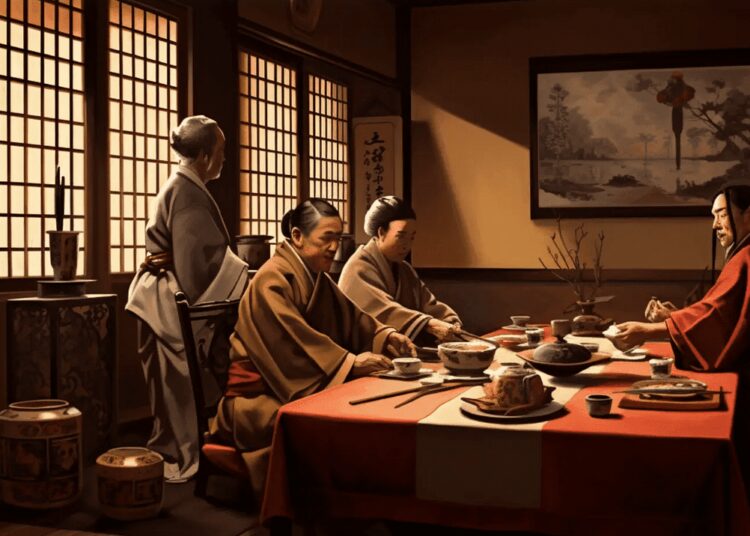The Ancient Samurai Code: Unveiling the Traditions and Customs of Japan’s Military Elite explores the rich traditions and customs of the ancient samurai, delving into the principles that governed their actions and the legacy they left behind. The origins of the samurai date back to the 12th century, when they emerged as a class of warriors who pledged their loyalty to powerful feudal lords. At the core of the samurai way of life was the Bushido code, which encompassed values such as honor, loyalty, courage, and stoicism. The article also discusses the rituals and customs that the samurai adhered to, including tea ceremonies, meditation and Zen practice, and swordsmanship and martial arts training. The legacy of the samurai continues to influence Japanese culture and society, serving as a timeless symbol of courage and honor.
The Ancient Samurai Code: Unveiling the Traditions and Customs of Japan’s Military Elite
Introduction
Samurai warriors, known for their unwavering loyalty, discipline, and martial skills, were an integral part of Japan’s feudal society for centuries. The samurai code, also known as Bushido, served as a moral compass for these elite warriors, shaping their way of life both on and off the battlefield. In this article, we will delve into the rich traditions and customs of the ancient samurai, exploring the principles that governed their actions and the legacy they left behind.
The Origins of the Samurai
The origins of the samurai date back to the Kamakura period in the 12th century, during a time of political turmoil in Japan. The samurai emerged as a class of warriors who pledged their loyalty to powerful feudal lords, known as daimyos. These skilled warriors played a crucial role in enforcing law and order in a society plagued by internal conflict.
The Bushido Code
At the core of the samurai way of life was the Bushido code. Bushido, which translates to “Way of the Warrior,” was a set of ethical principles that governed every aspect of a samurai’s existence. Honor, loyalty, courage, and stoicism were among the key values encompassed in this code.
Honor (Meiyo)
For a samurai, honor was paramount. They were expected to uphold their honor at all costs, even if it meant sacrificing their life in the process. The idea of losing face or tarnishing their reputation was unbearable for a samurai. Their word was their bond, and they would go to great lengths to fulfill their obligations and promises.
Loyalty (Chugi)
The concept of loyalty was deeply ingrained in the samurai code. A samurai pledged utmost loyalty to their lord, committing themselves to serve and protect them without question. They regarded loyalty as a sacred duty and would fight to the death to defend their daimyo. This unwavering loyalty often extended to their comrades and fellow samurai as well.
Courage (Yuki)
A samurai was expected to display immense courage and fearlessness in battle. They firmly believed that true courage was not the absence of fear, but rather the ability to act despite it. The fearless samurai would charge into battle without hesitation, knowing that their duty called them to face death without flinching.
Stoicism (Jisei)
Stoicism was another fundamental virtue in the Bushido code. Samurai warriors were trained to maintain composure, even in the face of adversity and hardship. They believed that showing emotions publicly was a sign of weakness. Stoicism enabled them to endure pain, suffering, and loss without losing their focus or resolve.
The Rituals and Customs
Alongside the moral principles of Bushido, the samurai also adhered to numerous customs and rituals that emphasized discipline and self-control. These rituals played a crucial role in shaping their character and strengthening their resolve.
Tea Ceremonies
Tea ceremonies were an integral part of samurai culture. These ceremonies blended the aesthetics of Japanese tea preparation with Zen Buddhism, emphasizing harmony, respect, and tranquillity. The tea ritual provided a moment of relaxation and reflection, allowing samurai warriors to find inner peace in the midst of their chaotic lives.
Meditation and Zen Practice
Meditation and Zen practices were deeply intertwined with the samurai’s way of life. These practices aimed to cultivate a state of focused awareness, enabling the warriors to sharpen their senses and achieve mental clarity. By embracing Zen Buddhism, they sought to transcend their earthly attachments and find enlightenment.
Swordsmanship and Martial Arts
Training in swordsmanship and other martial arts was a vital component of a samurai’s education. Mastery of the sword, in particular, was highly prized, as it was considered the embodiment of a samurai’s soul. These ancient combat techniques not only enhanced their physical abilities but also served as a means to discipline their minds and cultivate a strong spirit.
The Legacy of the Samurai
The samurai’s legacy continues to influence Japanese culture and society to this day. Their unwavering dedication to honor, loyalty, and discipline serves as a guiding light for many individuals striving for personal growth and moral righteousness.
While the age of the samurai has long passed, their philosophy and traditions live on. The Bushido code continues to inspire people worldwide, transcending geographical boundaries and cultural differences. The samurai’s indomitable spirit, discipline, and commitment to their principles make them a timeless symbol of courage and honor.
Conclusion
The ancient samurai code, with its emphasis on honor, loyalty, courage, and stoicism, unveils a rich tapestry of customs and traditions that shaped Japan’s military elite. Their adherence to the Bushido code and participation in rituals such as tea ceremonies and martial arts helped forge an unparalleled legacy that continues to captivate our imagination. The samurai’s influence persists, reminding us of the importance of living a life guided by principles and leaving behind a lasting impact on the world.













